Plant Information Resource Center
A Service Provided by Bohn's Farm and Greenhouses
Ratibida pinnataConeflower, Grey Headed
Large yellow flowers with drooping petals surround a brown seed head. Plants bloom profusely all summer. Birds eat the seed if old flowers are left on the plant.
[
More Info
]
|
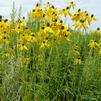
|
Rheum 'Victoria'Rhubarb, Edible
Huge leaves on thick, green stalks that are reddish at the base. Produces heavy yields beginning in the second season. Use stalks (only) to make delicious tart pies and sauces.
[
More Info
]
|

|
Rhus aromaticaSumac, Aromatic
[
More Info
]
|

|
Rhus aromatica 'Gro-Low'Sumac, Fragrant
A low spreader with glossy green leaves and superb orange-red fall color. Grows quickly and makes a good ground cover.
[
More Info
]
|

|
Rhus glabraSumac, Smooth
Sumacs are well known for their excellent color in autumn, when the long compound leaves turn bright orange and red. Plants produce yellow flower clusters that later form large bright red berry clusters. The fruits persist long into winter, and many birds and other wildlife rely on them for a food source. Colony-forming, Smooth sumac is the only shrub or tree species native to all 48 contiguous U.S. states. Larval host to the Hairstreak Butterfly.
[
More Info
]
|

|
Rudbeckia fulgidaConeflower, Orange
Masses of golden daisies from mid to late summer on long-lived, adaptable plants. Equally useful in a flower border or prairie meadow.
[
More Info
]
|
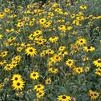
|
Rudbeckia fulgida 'Goldsturm'Black-Eyed Susan
A superior selection of our native Rudbeckia with long-blooming deep yellow flowers on stiff stems. An extensive root system makes this perennial an excellent choice for slope stabilization. [PPA-1999]
[
More Info
]
|
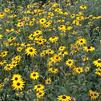
|
Rudbeckia fulgida var sullivantii 'Little Goldstar'Black-Eyed Susan
Golden yellow blossoms are held just above the short clump of rich green, bushy foliage. Very well branched scapes carry loads of flowers July through October. Over 80 flowers have been counted on a single plant, making this selection more floriferous than 'Goldsturm'. While 'Goldsturm' can stand waist-high in bloom, 'Little Goldstar' is much more compact. This variety is produced by tissue culture and provides a more uniform plant than the seed grown 'Goldsturm'. Attracts songbirds.
[
More Info
]
|
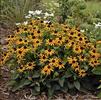
|
Rudbeckia hirtaDaisy, Gloriosa
Bright yellow to orange-yellow flower petals surround dark brown centers. Blooms June through September. This short-lived perennial will remain in the garden for many years if allowed to self-seed.
[
More Info
]
|

|
Rudbeckia hirta 'Indian Summer'Daisy, Gloriosa
Single golden yellow flowers with brown centers are 6" in diameter. Tolerates poor soil but needs good soil drainage. A 1995 All-America Selection winner.
[
More Info
]
|

|
Rudbeckia maximaConeflower, Giant
Yellow drooping petals surround a brown cylindrical cone. Flowers are borne on tall (60-96" stems) but stems are see-through so plant it where you can see the bold, mounded blue-green leaves which are attractive even before the plant flowers.
[
More Info
]
|
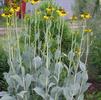
|
Rudbeckia missouriensisBlack-Eyed Susan, Missouri
This native is loaded with gold flowers with brown centers for several weeks in summer.
[
More Info
]
|
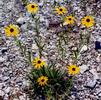
|
Rudbeckia subtomentosaConeflower, Sweet
Lovely, butter yellow daisies, each 3 across, decorate large, well-branched plants. Foliage is an attractive gray-green. For more compact plants, pinch lightly in spring.
[
More Info
]
|
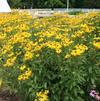
|
Rudbeckia subtomentosa 'Henry Eilers'Coneflower, Sweet
This plant was named for the fellow that discovered it along a stream in Montgomery County, Ill. Strong upright clumps to 5' or slightly more bear numerous clusters of finely quilled light yellow flower petals with brown cones in August and September.
[
More Info
]
|
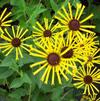
|
Rudbeckia subtomentosa 'Little Henry'Coneflower, Sweet
'Little Henry' offers the same true yellow, quilled blooms as 'Henry Eilers' but its smaller size makes it more functional for the average garden. 'Little Henry' is in bloom from summer until frost. A great choice for cut flowers.
[
More Info
]
|
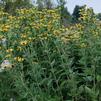
|
Ruellia humilisPetunia, Hairy Wild
Wild petunia is a Missouri native perennial which occurs in dryish soils in open woods, glades, prairies and fields throughout the State except for the far southeastern lowlands. Charming, low growing clumps produce light purple tubular flowers from May to Oct. The flowers arise in groups at the leaf axis. The square stems and the leaves are both quite hairy-a natural defense against dry conditions.
[
More Info
]
|
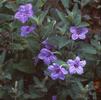
|
